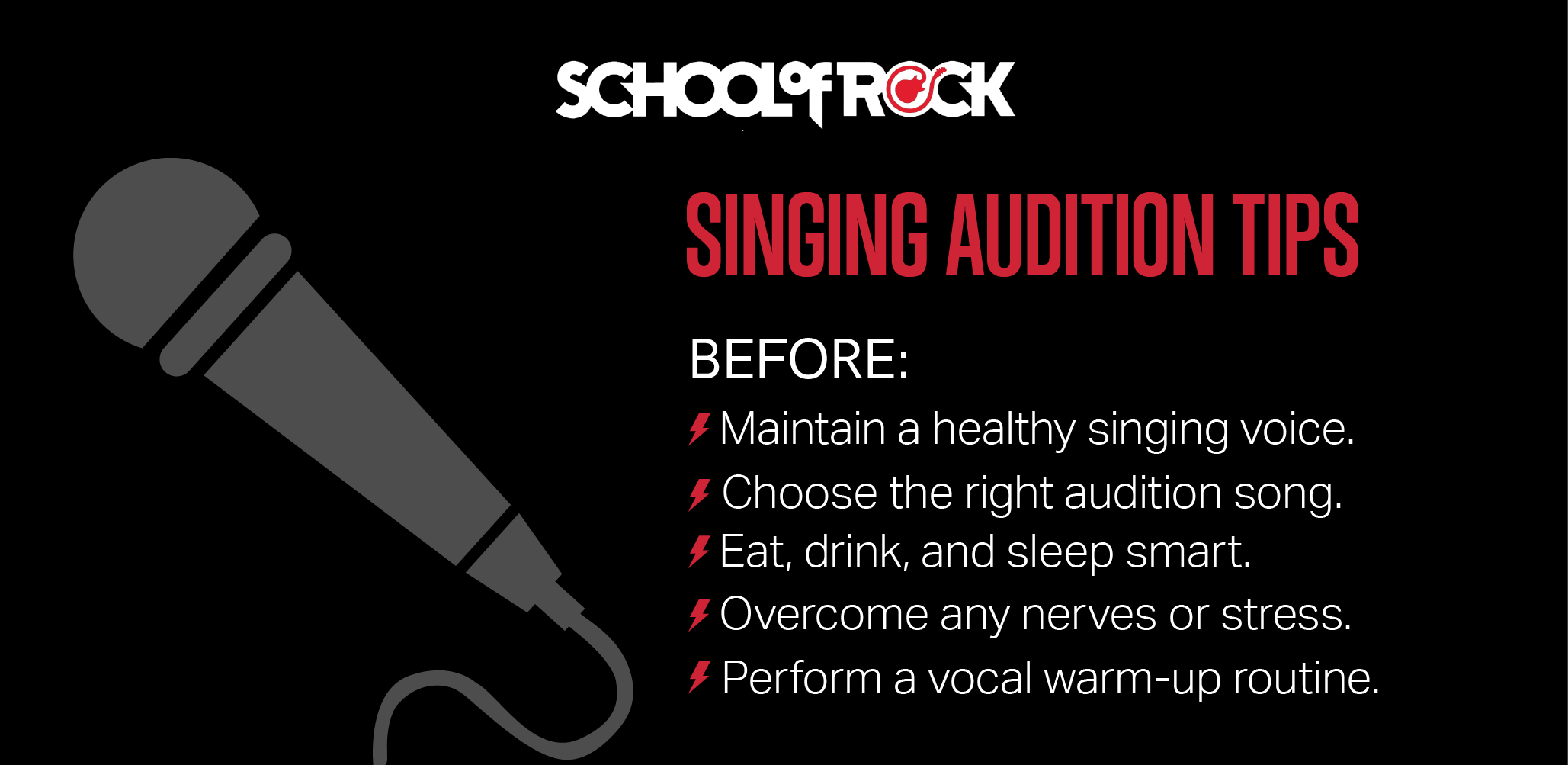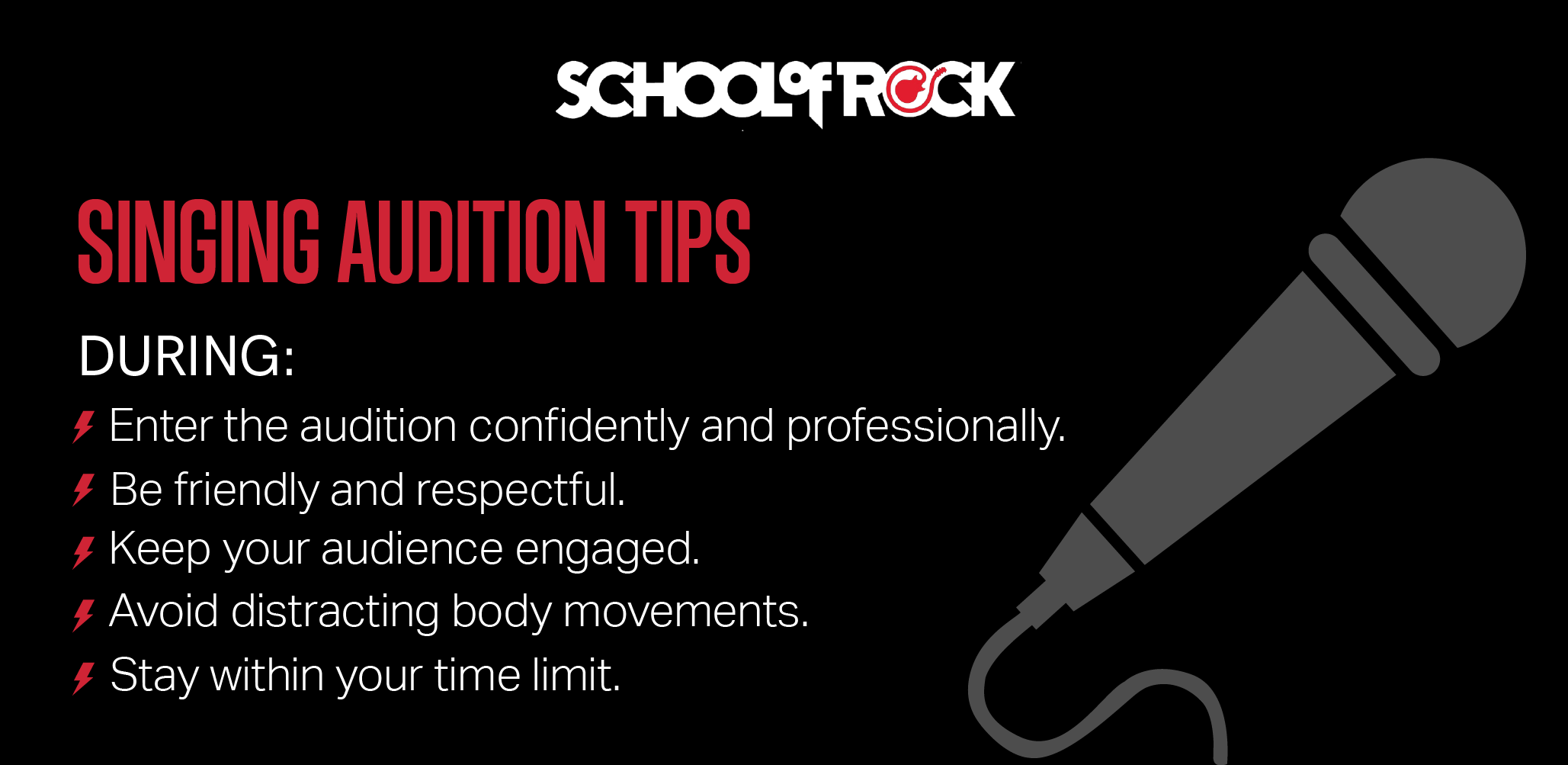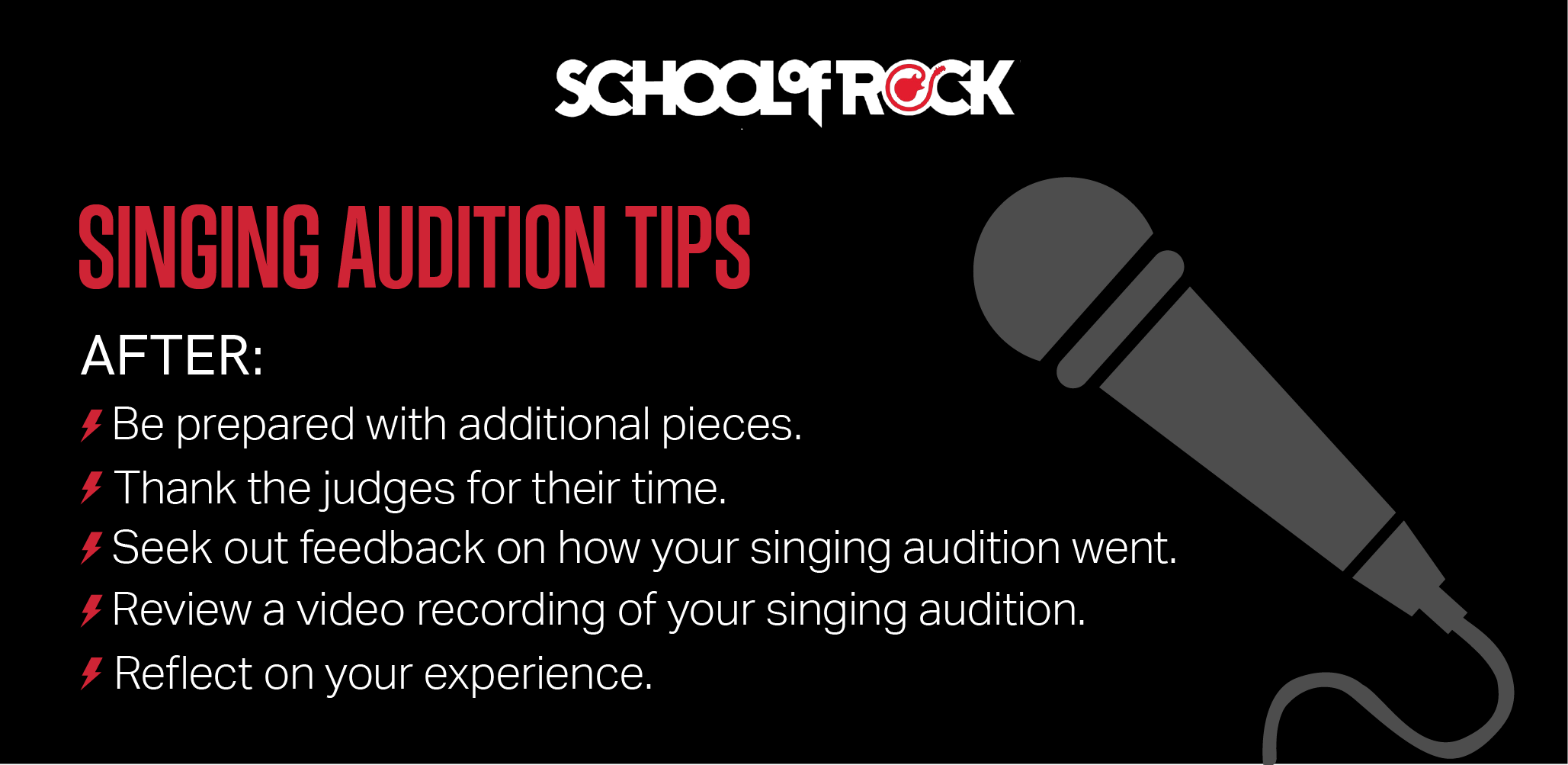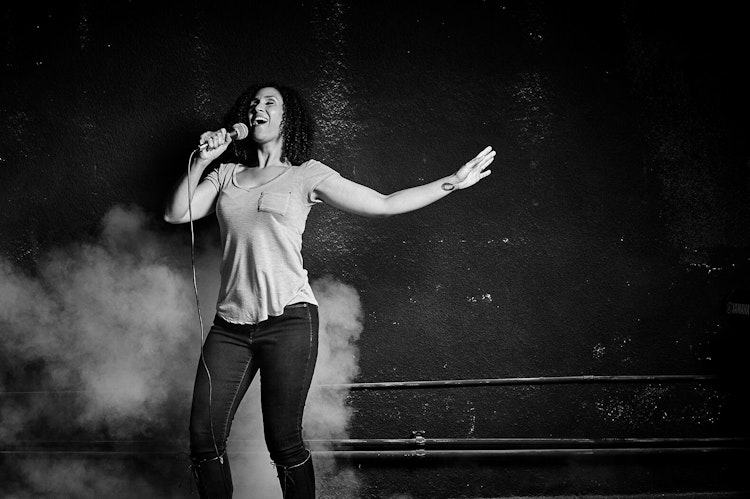15 Tips to Excel at Your Next Singing Audition
Whether this is your first time auditioning or your 50th, there are things that you need to know to make it the best audition possible. Not only does a singing audition rely on skill, but a few other factors come into play to make the audition a true success. In addition to skill, one must properly possess the 3 “Ps”: practice, preparation, and presentation. Without one or any of these, the audition is not complete. It takes all parts working as a whole to make everything as successful as possible. Skill is one thing, but you must be able to practice your instrument properly, take time beforehand to prepare your thoughts and words, and then successfully present them with confidence and accuracy in front of a judge(s). This is just as important as the skill itself.
There are a few parts to a typical audition. One main part is to sing 1-2 minutes of a song of your choice, or for some singing auditions, they ask for 16 measures of a song. This song may or may not be acapella, so you will want to be ready to sing with or without accompaniment. Another part of the audition may be to sing a song of the judge’s choice, or a specific part of a song if auditioning for a specific role. Depending upon the type of audition, you may be required to do sight reading. Sometimes you may be asked to sing solfege, other times it is just singing a specific part of a song on “la.” In some cases, there is more than one round of singing auditions. Sometimes you will wait the same day for Round Two, other times you may have a “callback,” which means you will come back at a different time and present the material they ask of you. Whatever the case you will want to be prepared to have a successful audition.
Below are 15 expert suggestions to help you succeed to your greatest potential before, during, and after your singing audition:

BEFORE YOUR SINGING AUDITION
This is where we will review everything you need to know before your audition, including music preparation, vocal exercises, and how to keep any stage fright away.
TIP #1: MAINTAIN A HEALTHY SINGING VOICE
A vocalist's instrument is their voice. Consider how carefully musicians treat their instruments by keeping them in cases. The same thing applies to your voice. It is important to remember to take care of your instrument and find your vocal range, or else it simply won’t work properly. Some examples of how to take care of your voice are proper warm-ups, singing from the diaphragm, occasional resting from using the voice, and most importantly, drinking water. Keeping the voice healthy is particularly important because you want to have your singing voice forever. When things are taken care of properly, they last. You don’t want to ruin your voice at any point, so here are 7 tips on how to keep your singing voice healthy.
TIP #2: CHOOSE THE RIGHT AUDITION SONG
You must make sure that you choose the song best suited for your voice. People often sing songs they think people want to hear or will impress them, so they choose one that is far too challenging for their skill level. You want to show off your strengths but you must also acknowledge any weaknesses of the voice so you know which songs not to choose. People sing the best when they can feel the song—when it means something to them and they genuinely enjoy it. Take time to find a song that you connect with, that feels good in the throat with no tension, and that is also appropriate for the context of the audition. The song choice can make or break an audition and can be a deciding factor on whether you get a callback or not, so choose wisely.
TIP #3: EAT, DRINK, AND SLEEP SMART
Water is the key to life. That being said, aside from water, there are a few foods that you should consume before your audition. Honey, lemon (in water), veggies, berries, and lean proteins are all very good to have before an audition. You want to avoid sugar, dairy, and general overeating because this will cause not only a stomach ache but also a mucus build-up in the throat and it will be hard for you to sing clearly. It is also of utmost importance to get a full night’s rest the night before an audition. You do not want to feel sluggish, tired, and weighed down at all. Be smart and go to bed early.
PRO TIP: Eat lightly before an audition and drink eight glasses of water a day for maximum proper vocal maintenance.
Tip #4: Overcome any nerves or stress
It is normal to feel nervous before, during, and even after an audition. This is called “stage fright.” You are stepping out of your comfort zone and into a space where the next 10 minutes of your day will rely on everything you have been practicing, and that is nerve-wracking. But there is a simple solution that people already have unknowingly, and that is your breath. To breathe is to be alive. With every breath of life comes a new energy flow, which in yoga terms we call “Chi.” To calm the nerves you must keep the energy steady.
One of the best breathing exercises for singers to calm a racing, anxious heart and mind is to find that tall posture we mentioned previously—roll the shoulders back, lengthen the spine, and find a position where you can breathe comfortably. The lungs are inside the rib cage, so keep the rib cage open when you breathe. Begin to inhale slowly for the count of six, then hold at the top for three seconds, then slowly release the breath for another six seconds. Repeat this a minimum of three times, but you can always do as many as you need. Not only does this force you to pause and reground yourself in the present moment, but it physically relaxes the nervous system and helps soothe any unwanted stress. You will feel lighter and calmer once you regather your breath.
Another one of our audition tips for singers is to find a meditation or a quiet place in your mind. By using the breathing practice, it will help you feel more in tune with your mind, and it won’t feel like it is racing anymore. One conscious inhale and one conscious exhale is a meditation. You won’t be able to control how everything goes that day, but you can control your breath and therefore your mind space. Here are some more audition tips for singers on how to overcome stage fright.
Tip #5: Perform a vocal warm-up routine
The key to learning anything is consistency and repetition. While it's best to start singing at an early age, it's still very possible to become better at something by creating a new routine. This holds true whether you're learning to play an instrument, a sport, or learning a new hobby. A routine, or ritual, mindfully takes time out of your day to better yourself.
The best thing you can do for your voice, aside from drinking ample amounts of water, is to warm up. In the same way that you must stretch before a run or sport, you must warm up before singing. Your throat itself has muscles all around the neck and jaw, and these muscles must be stretched too. By properly warming up, you can avoid straining a muscle and a sore throat.
Take time to start with breathing and grounding. Once you can feel connection with your breath then begin your warm-ups of choice. Keep it simple, but helpful. Choose an exercise or two that you like that goes both up and down the scales as well as doing siren sounds to relax any tension out of the throat. Get in the habit of doing this every day. It takes at least 30 days to build a habit, but it will become easier every day. Don’t procrastinate the stretches and wait until the day of the audition. They will be much more beneficial if you take a little time every day and remain consistent with your warm-ups. If you need some ideas for warm-ups, check out our 9 best vocal warm-ups.

During your singing audition
This is where we will go over everything you need to know during the actual audition such as proper etiquette, nervous habits, and how to keep a calm and confident mindset.
Tip #6: Enter the audition confidently and professionally
Your first impression sets the tone for the rest of your audition. Be sure you get there early to allow some time to breathe and relax before your audition. You do not want to appear rushed or let your nerves show too much. The judges are on your side and want you to succeed. If you walk in with a professional, confident, good energy then that will reflect into your audition, which is much better than going in with a hesitant, unpleasant energy. The judges will feel your energy and confidence the minute you walk into that room.
Positive vibes attract positive energy. Roll the shoulders back and then relax them down. As you inhale, lengthen your spine and pretend you have a string pulling out the top of your head. Keep this posture and slowly exhale until you are standing in good posture and feel ready to sing. You will want to make sure you dress appropriately, introduce yourself, speak slowly and clearly, have materials at the ready, maintain your good posture, and do not apologize if you mess up. No one needs to know you are nervous. You have been practicing for this with a purpose, so be confident and perform to the best of your abilities.
Tip #7: Be friendly and respectful
When you get to the audition, remember that you are a guest entering their space. Be friendly, courteous, kind, and always smile. A smile is a friendly look, and you don’t want to come across as unfriendly by going in without a smile. Be happy you are there; they are happy to see you.
There is a certain respectful etiquette that comes with attending an audition and interacting with judges. It is important to be aware of their cues and wait for them to direct you in what to do next. They will tell you when they are ready for you to begin and will most likely tell you what to sing first. Sometimes the judges let you pick which order you’d like to present your audition material in, other times they will tell you what to do first. Also, it is not uncommon for people to become talkative when nervous. Try to be mindful of this and avoid being overly talkative. You are there for a specific reason, don’t overthink anything. If they ask you to do something again or they ask you to sing something else, just breathe and try not to get flustered or worried. You will have prepared for this, so stay friendly and respectful of whatever interactions you may have.
Tip #8: Keep your audience engaged
When entering your audition space, remember to be your natural human self, and not robotic and boring. You want to capture and keep the judge’s attention in a friendly and respectful way. Remember, people look friendlier when they smile. It also feels good when people look at you when talking, so be sure to make eye contact and not be afraid of them. Don’t feel the need to stand entirely still either—utilize your space and let yourself feel the music. Allow the body to move to the beats instead of locking up. Again, you are not a robot. You want to communicate emotions through your audition and make the judges feel different emotions as well. Stand tall, smile, breathe, and take control of the room with your confidence. Mind your ego, and don’t get cocky. Stay professional and respectful the entire time and have fun.
Tip #9: Avoid distracting body movements
There is a difference between feeling the music and moving just to move. You want to be mindful of your movements, and make sure they flow as smoothly and naturally as your breath. You don’t want your body movements to distract you from your actual performance and voice, so try to avoid things such as pacing and foot tapping. You want them to hear your voice and see your emotions, and not become distracted by accidental offbeat movements. Do not lock your knees, this will cause the body to tense up and you may feel off balance if they are locked for too long. Keep a gentle bend in the knees and allow your body to move while keeping your feet planted. Do not stiffen up the body; just allow yourself to feel the music and naturally flow with the rhythm.
Tip #10: Stay within your time limit
Be mindful that you are not the only person auditioning, and there will most likely be a time limit. Sometimes there is no time limit, but if they instruct you to learn 1-2 minutes of a song, then pick the part of the song that shows off your voice the best. This is mostly always a verse into the chorus. If there is a time limit, you can skip any intros or jump right into the verse.
You only have a certain amount of time to wow the judges, and just because you have a time limit doesn't mean you have to start at the beginning of the song. Start where it makes sense. Remember your emotions and find the part of the song where that shines through. Use a timer to see how long the piece ends up being and adjust accordingly. Go into the audition prepared with the higher end of your time limit, and make sure you don’t sing too little or too much. Prepare beforehand and time yourself.

After your singing audition
Tip #11: Be prepared with additional pieces
It is especially important to come prepared with additional pieces that you’ve rehearsed just in case the judges disapprove of your initial choice or want to hear you sing more. Sometimes the judges feel the initial song doesn’t always portray your voice at its finest, so they may want you to try a different piece. Be ready for anything - better to be overly prepared than not adequately prepared at all.
Tip #12: Thank the judges for their time
It is important to leave a good impression on the judges and thanking them for their time is the best way to make your final mark. You want to be remembered as someone who appreciates the opportunity you were given and who is friendly and easy to work with. They will remember you thanking them and they will remember the ones who did not thank them. Kindness and gratitude are what allow you to stick out amongst a crowd. Thanking them is a simple and important way to leave a good impression.
Tip #13: Seek out feedback on how your audition went
One of the most important things you can do for yourself is to get feedback and constructive criticism from the judges. Minding the ego and remembering not to get cocky is important, as we all have things we continuously need to work on because that’s what growing is, continuous work. Listen to feedback and run with it. Use it to improve for the next time and keep an open, receptive mind. Try not to get frustrated or upset; sometimes feedback can be tough to hear, but it will ultimately benefit you and your singing career. They are trying to help you and have been doing this for years, so take any advice you can and grow.
Tip #14: Review a video recording of your audition
Any musician will tell you that it is extremely useful to record a vocal lesson to see where you need to improve. In this same way, recording your audition is a good idea too, if possible. This will give you something to refer back to and learn from after your audition has ended. You can ask a friend to attend or record if guests are allowed. Otherwise, you can always set up the video on your phone and place it down on a table or chair so you can at least hear yourself later on. Remember, don’t be too hard on yourself. It is always odd to listen back to a recording of yourself singing, but it is one of the hands-down best ways to improve because you can hear it for yourself.
Tip #15: Reflect on your experience
No matter how good (or not so good) your audition went, it is important to take time to reflect on the experience and see where you can improve for your next audition. Acknowledge any mistakes and nervousness you may have had and think about solutions to help yourself between now and your next audition. Stay humble—even the best musicians can improve in one way or another. You are never done growing, so take time to reflect and home in on where you want to improve and how to do it.
What song should I choose for my vocal audition?
Choose a song that best suits your voice—you do not want something where you have to sing too low or too high. Consider choosing intermediate songs to sing that relate to what you are auditioning for and ones that you know when and enjoy singing. Don’t overcomplicate the song either. Music is what happens in between the notes, so keep it simple, be expressive, and choose something you genuinely enjoy.
Easy singing audition songs for beginners
- “Hit Me with Your Best Shot” by Pat Benatar
- “Eight Days A Week” by the Beatles
- “Girls Just Wanna Have Fun” by Cyndi Lauper
- “Every Breath You Take” by The Police
- “Somewhere Over The Rainbow” from Wizard of Oz
- “Yesterday” by the Beatles
Best singing audition songs for altos
“When We Were Young” by Adele
“Someone Like You” by Adele
“Poker Face” by Lady Gaga
“The Tide is High” by Blondie
“Dreams” by Fleetwood Mac
“Stand By Me” by Ben E. King
“There Are Worse Things I Could Do” from Grease
“I Can Hear the Bells” from Hairspray
Best singing audition songs for baritones
“Here Comes the Sun” by The Beatles
“Hound Dog” by Elvis Presley
“Lean On Me” by Bill Withers
“Your Song” by Elton John
“Kryptonite” by 3 Doors Down
“Piano Man” by Billy Joel
“On The Street Where You Live” from My Fair Lady
“Ladies Choice” from Hairspray
Frequently asked questions about singing auditions
What do judges look for in auditions?
The key things judges look and listen for are pitch, tone, accuracy of timing, how well you know your instrument, stage presence, and overall performance. It is the little details that make the audition great overall. They want to know you can sing but also want to know you can make the audience smile and have a good time. They also want to know you are teachable and able to take feedback and grow with it.
What are some good stage presence tips for singers?
You should never be standing still. There should always be some sort of sway or gentle head movements that show you can feel the music. Nobody wants to look at a stage and see someone standing stiff while singing a legendary Queen or Bowie song. They want to see an artist who can express a song with their voice and facial expressions. The original artists wrote these songs for a reason—they are all poetry. It is your job to let that shine through on each song you sing.
Watch videos of live performances and how the original bands performed these songs. Mimic them and practice singing with them, then go in and represent them. Find the fine line between performing the song and making it your own. You don’t have to jump around the stage to make an impact. Use your facial expressions and hands to help get the point of the music across to the audience. At the very least, hold the mic stand as a support instead of keeping your hands flat on your side.
How long should my singing audition be?
Singing auditions usually last no more than 10 minutes. When you practice, you should prepare about two minutes' worth of the music but plan to cut it to around a minute and a half. You do not want to go much over that, and sometimes the judges will cut you off if you lose track of your time. Time yourself before so that you know exactly what minute and half portion you want to sing (remember, look for a verse into a chorus that fits your voice best). Also, you'll want to improve your singing with a microphone, since some differences may take you by surprise.
There will normally be guidelines sent out before an audition on which songs to choose. Most times they request one minute of a song of your choice and one minute of a song out of a list of choices, but this can vary. You may be asked a theory question or two and then asked to sing something on the spot. This won’t take long; it goes by very fast so take your time and remember to breathe.
What do I wear to a singing audition?
You will want to wear something professional, yet comfortable and that makes you feel confident. Avoid wearing clothing that is restricting or too tight, as this will affect your ability to take full breaths. You want to look clean and put together since you are trying to leave a good first impression. It is not as formal as a job interview, but it is still a type of interview so you want to dress for confidence and success.
What should I bring with me to a singing audition?
For your audition, it is best to bring a folder or binder with the sheet music you will be singing as well as water to stay hydrated. If the audition is for a company or ensemble, your resume, headshot, and demo tapes may be required, so it is always good to have some ready to go.
As with most skills, practice makes perfect. The more singing auditions you do, the better you will get. Singing lessons can often be a good time to practice your audition songs and ensure you are in good vocal shape before your audition. Check out School of Rock singing lessons for all ages and skill levels and sign up for a free trial lesson below.
About the author
Kathryn Lanute is an advanced keyboard and vocal instructor at School of Rock Barrington in Illinois as well as a hot yoga and yin yoga teacher.





